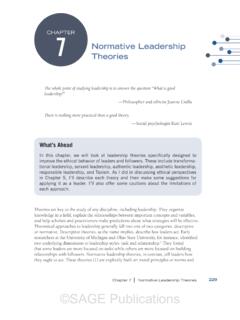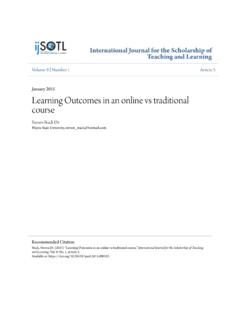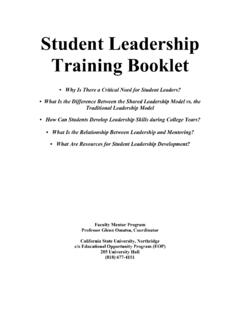Transcription of Traditional leadership and its future role in local governance
1 Traditional leadership and its future role in local governance * SAM RUGEGE Associate Professor. Law Faculty. University of the Western Cape I INTRODUCTION During the last few years a controversy has raged over the role of tradi~ tional leaders in governance . fuelled by the paSSin$ of legislation provid-Ing for a restructured local government system, (he demarca[ion of municipalities and the 2000 municipal elections that ushered in the new local government system. The controversy arose because (he new mu-nicipalities cover the whole country. including the rural areas under the jurisdiction of Traditional leaders. In rural areas municipalitles have pow-ers and functions that largely overlap with those that are supposed to be exercised by Traditional authorities.))]
2 Traditional leaders fear that once these municipal governments become fully operational, it will be the end of their influence and the end of Traditional authorities. This paper looks at the problem of rural local government. the competing issues at stake and the implications of the different strategies that might be adopted by government in resolving the problem. This paper also looks at the role of Traditional leadership in the pre colonial era, its distortion by colonialism and apartheid and the consider-able powers and functions enjoyed by Traditional leaders at the dawn of democracy. It then examines the constitutional provisions dealing with Traditional leadership in comparison to the powers and functions accorded elected local government.
3 The paper discusses the struggle of Traditional leaders to retain the powers they had under apartheid. the draft White Paper on Traditional leadership and governance , as well as the draft Tradi~ tional leadership and governance Framework Bill 2003 (hereafter the Bill) which propose to give Traditional leaders a greatly dim inished role in rural governance_ It also offers a comparative analysis of the position of tradi-tional leaders in some neighbouring countries. The paper does not go into the question of whether Traditional leadership , as an institution of govern-ance, is still relevant in a democratic society or whether in fact we are perpetuating a moribund institution or whether the large number of Traditional leaders in South Africa is sustainable.
4 This debate does not An earlier and shorter version of r~lis paper appears in Constitutiun and Law lV: Collo-q!lium on local Cowrnment Law: Seminar Report 2002 No 14 Konr,HJ-Adenauer-Sriflung. Johafl[\('s!J\lrg j local Government: Municipal StrtlC!ures Act I 17 or 1948 171 Reproduced by Sabinet Gateway under licence granted by the Publisher (dated 2009).LAW, DEMOCRACY & DEVELOPMENT seem fruitful given that the Constitution recognises the institution and permits Parliament (0 pass legislation providing for a role for Traditional leadership as an institution at local level.: 2 HISTORICAL OVERVIEW OF THE ROLE OF Traditional LEADERS Pre-colonial period Traditional leadership has been the basis of local government in most of Africa throughout history.))]
5 In pre~colonial Africa, African societies were ruled by kings supported by a hierarchy of chiefs and councillors or advisors, who were either their close relatives or selected from their communities. These Traditional leaders served as political, military, spiritual and cultural leaders and were regarded as custodians of the values of SOCiety. They looked after the welfare of their people by pro viding them with land for their subsistence needs through agriCulture and for grazing. They also provided for the very poor and orphans.' Traditional leaders were responsible for the defence of their people against external aggression and for keeping order in their communities.'; They resolved disputes. with the emphasis on reconCiliation, and thus ensured harmony among neighbours.
6 They inspired unity in their peo-ple. Pre~colonial African societies are reputed to have had a kind of participatory democracy. Through general assemblies of all adult men (known, among other terms, as kgotia, pitso or imbizo), the community participated in decision-making on important matters affecting the " It is important to note that even in pre-colonial times not all Traditional leaders were benevolent, generous and caring towards their people. Some were autocratic and However. if people were dissatisfied with their leader they could desert him for another, arrange for his death or overthrow him through civil On the whole, though, it can be said that in much of pre-colonial Africa Traditional leaders ruled largely with the consent of their people.
7 2 The Consricution of thf~ Rf!pubJi( of South Africa Act 108 of 1996. s 212( I ) 3 See. for instance. Schapera 1955' 68, Ashton (1967: 213) paims out thar alrhough the pre colonlal generosiry of Basotho chiefs was diminishing under colonial rule. there were chiefs who still looked after many orphans and widows 4 Schapera 1955: 69 5 Ashton (1967: 216) states: "DiSCUSSIOn. according ro contemporary observers, was keen. great freedom or speech was allowed. and great weight il(lached (0 the opillion and altitude of tile people, The pf!ople, as of lei I as not, followed [fie IIIIe [hey judged the chief WaS Laking. bill if. lur sOHie reason They opposed him. alld he expected rheir op-positioll (0 be firm. fie would nor ,k forcing rhe iC,SII<.))))]]
8 Schapera. however. qllallfles the value of these assemblies: "In theury greilr frt:cdorn of speech i~ permined at these mt:eling,>_ III practice the feM or sllbsequent reprisals by rhe chief ohen acts as a de\er-rem" (Scllclpcra 1955: H~l. 6 See NtsebeZa 1999, 3 7 SCl'iapcr<-l 19:i:i' 8:i. Astl[llIl 1967: 217 172 Reproduced by Sabinet Gateway under licence granted by the Publisher (dated 2009).TRAD[TIONAL leadership AND [TS future ROLE IN local GOVEI{NANCH Colonialism and apartheid With the advent of colonisation the most important powers were taken over by the colonial state and later, in South Africa, by the apartheid state, thus weakening the role of trarlitional learlers and institutions in governing African people. However, the day~to~day running of government activities was left to Traditional leaders as agents of their colonial masters.)]]]}
9 Tradi tional learlers were no longer accountable to their people but to the colo~ nial or apartheid government.~ Traditional institutions were transformed into agencies (tribal authorities) of the alien state and more powers were given to these tribal authorities to control the African population in order to better serve colonial/apartheid interests. The colonisers did not have enough personnel who could easily deal with social control of the 'natives' and mobilise them for the labour requirements of settler farmers, for the construction of roarls and railways, for mining, etc. It was easier and more cost effective to use the existing administrative structures of the African people -the Traditional leaders. Many Traditional leaders became oppressive towards their people, who could rlo nothing about it as the coercive machinery of the colonial state protected the Thus many leaders lost their legitimacy with their people.
10 Nationalist and liberation movements that fought for independence regarded Traditional leaders (or chiefs, as they were renamed by colonialists) as collaborators in colonial oppression and at independence they were marginalised in most countries in Africa. The nature of Traditional authority under colonialism and apartheid was distorted, in that the right to office of Traditional leaders was no longer automatically based on hereditary rights based on the principle of male primogeniture. Although this principle was largely maintained, the state could appoint anyone to be a chief and could dismiss a chief who quali fied as such according to custom if he did not conform to the require~ ments and did not serve the interests of the The state was empowered also to grant jurisdiction 1O chiefs LO hold courts in their areas on civil and criminal matters and could also take this jurisdiction This power has survived into the post-apartheid political dispensation assigned to provinces.













